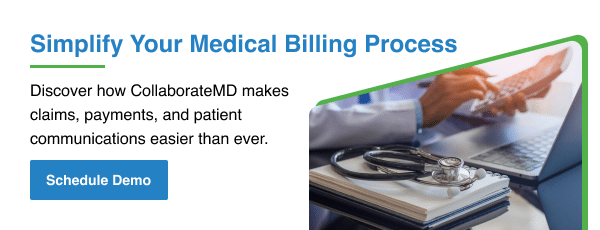Understanding the basics of cardiology medical billing can help cardiologists and office administrators ensure payments for cardiology services are accurate and timely.
Effective cardiology billing requires a thorough understanding of the services provided, the various payers involved, and the regulations governing billing and medical coding practices. By staying up to date on these requirements and using medical billing software for practices, cardiologists can ensure accurate and timely payment for their services while maintaining the financial health of their practice.
Whether you’re a cardiologist, a cardiology office manager, or part of a medical billing team or coding team, this article will help you to better understand some important cardiology medical billing guidelines.

Cardiology Medical Billing: Essential Workflows, Codes & Best Practices
Cardiology medical billing involves some of the most complex coding and documentation requirements in healthcare. From split billing for diagnostics and procedures to navigating specific CPT and ICD-10 codes for cardiovascular care, accuracy is essential for getting paid on time.
In this guide, you’ll learn how to:
- Properly bill for EKGs, stress tests, echos, and catheterizations
- Apply the right modifiers and avoid common coding errors
- Reduce denials and speed up reimbursement cycles
- Streamline cardiology billing with EHR, RCM, and automation tools
Whether you’re a cardiology biller, office manager, or provider, this article offers expert guidance to help you stay compliant, improve cash flow, and manage the complexities of cardiology billing with greater efficiency.
Understand the Cardiology Billing and Coding System
Cardiology medical billing primarily uses the Current Procedural Terminology (CPT) and International Classification of Diseases (ICD) coding systems. CPT codes identify the services provided, while ICD-10-CM are diagnosis codes or give a reason for the services rendered. CPT codes get organized into sections based on the type of service, like evaluation and management, anesthesia, surgery, radiology, and pathology.
Cardiology medical billing services are covered by a wide variety of codes. To demonstrate, here are just a few cardiology CPT codes and their meaning:
- 93000 – A heart test called an Electrocardiogram (ECG) with at least 12 wires and a report explaining the results
- 93306 – Echocardiography, a heart test that uses sound waves to create pictures of the heart in real-time and includes a feature called Doppler to check the blood flow, with a complete record of the images
- 93510 – A cardiovascular stress test involving exercising on a treadmill or bicycle as a patient’s heart is monitored by electrocardiogram, or using medicine to mimic the effect of exercise, with a doctor overseeing the entire process
The American Medical Association (AMA) updates the CPT codes yearly to reflect medical practice and technology changes. These ever-changing codes mean that cardiology medical billers and coders must stay current to ensure accurate billing, receive reimbursement, and avoid missing charges. In addition, insurance carriers may have their own specific requirements and guidelines for billing cardiology services; it is essential to be aware of these as well.
An in-depth understanding of cardiology procedures and the cardiology coding system used for medical billing will ensure accurate reimbursement. Professional certification in this field, such as the Certified Cardiology Coder (CCC) certification offered by the American Academy of Professional Coders (AAPC), can help demonstrate proficiency in this area. AAPC certified coders have demonstrable expertise and knowledge in both medical coding and billing practices, and are an asset to any cardiology billing or cardiology coding team.
| Related article: What You Need to Know About Physical Therapy Billing

Verify Insurance Coverage for Cardiology Services
Verifying coverage helps to ensure patients do not receive unexpected bills for cardiology services. It allows patients to understand their financial responsibility and plan accordingly. It also prevents patients from being surprised by bills they cannot afford, which can cause financial stress and potentially prevent patients from seeking necessary future care.
For healthcare providers, verifying coverage is essential for avoiding payment denials and delays from a payer. Denied claims occur when insurance companies refuse to pay for a particular service, and payment delays happen when insurance companies take a long time to process claims. Both denials and delays can lead to a loss of revenue for cardiologists and hinder their ability to provide quality care to patients.
Verifying coverage also helps cardiologists understand insurance policies and requirements. By understanding insurance policies, providers can ensure they are providing covered services by the insurance and can communicate with their patients about any out-of-pocket expenses that may arise. Ultimately, this helps to establish trust between patients and providers and can improve the patient experience.
Document Cardiology Codes and Claims Accurately
Accurate documentation in cardiology medical billing is essential for several reasons. Firstly, it ensures correct diagnosis and treatment codes, which is crucial for proper reimbursement from insurance companies. Incorrect codes can result in delayed or denied payment, so providing clean claims (claims that are accepted on the first attempt) is a great way to shorten your billing cycle.
Secondly, accurate documentation allows for continuity of care between healthcare providers. When medical records are complete, providers can review medical history, assess their patient’s current condition, and make informed decisions about their treatment plan. The result is better patient outcomes end-to-end.
Thirdly, accurate documentation in cardiology medical billing services must comply with regulatory requirements. Both Medicare and other insurance suppliers require that medical practices maintain accurate and complete medical records to ensure compliance with billing and coding guidelines. Failure to satisfy these requirements can result in fines and legal repercussions.
Finally, accurate documentation protects medical practices and cardiologists from legal liability. Inaccurate or incomplete medical records can result in malpractice claims, which can be costly and damage or even ruin a cardiologist’s reputation.

Submit Cardiology Claims on Time
Timely insurance submissions are critical in ensuring patients receive the care they need without incurring unnecessary financial burdens. With the increasing complexity of medical insurance, it is essential for cardiology practices to have an efficient medical billing system in place to avoid claim denials and delays in reimbursement. By submitting claims promptly, cardiologists can guarantee swift payment for their services and avoid potential penalties for late submissions. Cardiology practices may have to obtain pre-authorization from insurance companies before performing procedures to avoid claim denials or claim rejections and to ensure that the patient’s insurance will cover the cost.
Additionally, submitting claims on time helps maintain positive relationships with insurance providers and patients, which can be invaluable in building a strong and thriving clinic. Medical billing strategies should prioritize timely insurance submissions to ensure the financial health and success of the cardiology practice.
| Related article: What You Need to Know About OBGYN Medical Billing
Keep Up with Guidelines and Regulations
Medical billing services for cardiology are complex due to the numerous procedures and treatments involved in each sub-specialty. For accurate billing and reimbursement, practices must stay current with the latest regulations and guidelines.
A significant aspect of cardiology billing is ensuring proper coding of procedures and diagnoses. Cardiology procedures often have multiple codes associated with treatment, and it is crucial to use the correct codes to avoid claim denials or delays. A cardiology coder must stay informed about changes to medical coding guidelines and confirm they are using the most recent versions of coding manuals.
Another consideration in cardiology medical billing is compliance with regulatory requirements. Cardiology providers must fulfill a range of parameters, such as those related to the Health Insurance Portability and Accountability Act (HIPAA), the Centers for Medicare and Medicaid Services (CMS) guidelines, and the Affordable Care Act (ACA). Cardiologists and office administrators must stay informed about any changes or updates to these regulations to maintain compliance.
Use the Latest Medical Billing Technology
The use of technology has revolutionized medical billing services in recent years. Electronic health records (EHRs) have replaced traditional paper records, making it easier for healthcare providers to record and track patient data. EHRs also allow more efficient communication and collaboration between healthcare providers and billing specialists.
Additionally, electronic claims submission has streamlined billing services, reducing the time and resources required to submit and track claims. Cardiology billing specialists can also use technology to automate routine tasks, such as verifying patient insurance coverage and eligibility, freeing up time to focus on more complex billing issues.

Choose a Professional Medical Billing Software Solution
Managing billing services in-house may be difficult. While partnering with a professional medical billing company can help, it isn’t always the right answer. But proper medical billing software can be an easy and affordable way for any practice to better manage their medical billing process.
CollaborateMD is a medical billing software company that provides a cloud-based solution for medical practices and billing companies to streamline their billing processes. The software simplifies intricate billing procedures and provides both transparency and control over financial transactions.
CollaborateMD’s billing software includes features like automated claims processing, patient eligibility verification, online payment processing, and revenue cycle management. These features enable healthcare providers to automate billing processes, reduce errors, and improve cash flow.
The software integrates with medical billing codes and standards like ICD-10, CPT, and HCPCS, to keep claims accurate and compliant. It also provides real-time reporting and analytics, which enables providers to track their revenue, identify payment trends, and make informed decisions about their billing processes.
Moreover, CollaborateMD’s medical billing solution is HIPAA compliant, keeping patient data protected and secure. The software also offers support and training services to help users get the most out of the platform.
If you’re ready to see what CollaborateMD can do for your cardiology medical billing services, schedule a demo today.





